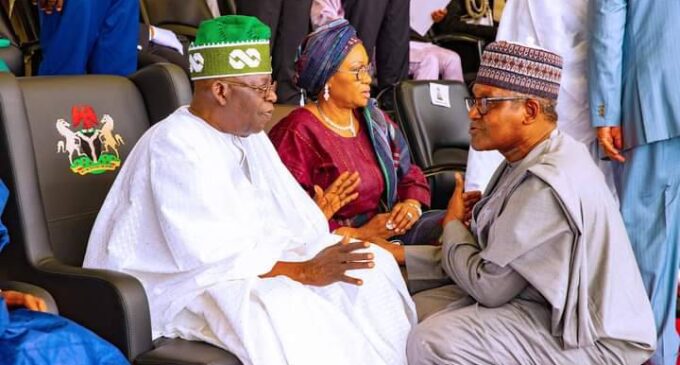Here’s what Tinubu’s speech means for the naira and petrol pump price

I hear you have questions. So do I. What does fuel subsidy removal really mean today? How much will a litre of petrol sell for? Does Dangote Refinery make any difference? How about inflation? These are the first round of questions from President Bola Tinubu’s inaugural speech on Monday. In this article, I will attempt an answer based on the economics of fuel subsidies and the politics of the nation, Nigeria.
In an almost poetic fashion, Tinubu stood before Nigerians at Eagle Square and said “On fuel subsidy, unfortunately, the budget before I assumed office is that no provision is there for fuel subsidy. So fuel subsidy is gone.” Like magic, minutes after the declaration, fuel queues resurfaced nationwide. Prices also began to jump.
According to the National Bureau of Statistics, petrol was sold for an average of N254.06 per litre in April 2023. Today, after the speech, it sold for as high as N500, with speculations of prices going as high as N750 in the coming days. But what can we expect?
HERE’S HOW PETROL PRICING WORKS
Based on Tinubu’s speech, not much changes in the pricing template — just the subsidy bit is removed. Let me explain with lessons from the past. In 2016, when the first subsidy removal was implemented by the Muhammadu Buhari administration, the Petroleum Products Pricing Regulatory Agency (PPPRA) released its new pricing template, which showed that two components make up the petrol price: landing cost and distribution cost.
At the time, the landing cost of one litre of petrol was N119.74, while the distribution cost was N18.37 per litre. This brought the total pump price to N138.11. PPPRA mandated fuel stations to sell between N135 to N145 per litre. Here, there was zero subsidy.
Along the line, the landing cost changed, following the increase in oil prices globally. The landing cost crossed N119.74, and distribution cost was slightly impacted, and total pump price exceeded the N145 mark PPPRA had set. In order not to lose money, fuel stations refused to sell. This led to fuel scarcity. So the government quietly reintroduced subsidy and tried to keep prices at N145, by paying the excess. This was not sustainable.
So in 2021, a new pricing template was “erroneously” published by PPPRA. It showed landing cost had jumped from N119.74 to N189.61 and the distribution cost moved from N18.37 to N23, bringing the total price to N212.61 per litre at the pumps.
Government then applied some subsidy, which allowed Nigerians to buy for about N165 per litre at the time — not the market price of N212.61.
In 2023, the landing cost and the distribution cost have changed, but the biggest change has been in the structure of the state oil company, which has now become NNPC Limited, and no longer has the absolute power to fix prices. The distribution cost today should be about N30 to N35 per litre, while the landing cost is where the conversation is.
The landing cost when the last PPPRA template was published in 2021 was $561.96 per metric ton. Today, this price is between $680 and $750 per metric ton. This should naturally bring the new landing cost per litre to N266 per litre. Add distribution cost, the expected pump price should be N296 per litre without subsidy.
All of this is based on the assumption that $1 is N403.80. This brings us to the second round of questions: What did Tinubu mean by unifying the exchange rate? How much will $1 sell for at the official market? What impact will that have on fuel prices and everything else?
TINUBU’S FOREIGN EXCHANGE POLICY
The president said his government “shall ensure that investors and foreign businesses repatriate their hard earned dividends and profits home,” adding that “monetary policy needs thorough house cleaning. The Central Bank must work towards a unified exchange rate”.
This immediately signals a free market system, where the real value of the naira to the dollar is employed across board. It suggests that no one will get $1 for N461 while another gets the same for N770, which is fair. But fair has consequences; the first of which may be the pump price of premium motor spirit (PMS).
Tinubu’s FX policy will likely mean a devaluation of the naira on the official side of the market. Bloomberg had previously reported an expected 15% to 20% devaluation, which will put the naira around N530 to N550 at the official market. Others are suggesting N600 per dollar if any real unification of exchange rates will be achieved.
Whatever the case is, the final decision will impact the landing cost of petrol from the international market. This may lead to an increase of anywhere between 15% to 40%. At a 40% devaluation of the naira (from N403 per dollar), which is expected to be the worst-case scenario, a litre of petrol should sell for about N415. Hence, all the predictions of N650 and N750 per litre are quite the stretch.
DOES DANGOTE REFINERY CHANGE ANYTHING?
On a good day, yes. But maybe not the pump price of petrol. The first sure thing we can count on Dangote for is support for a reasonable foreign exchange policy. According to the Central Bank of Nigeria (CBN) figures, Nigeria spends almost $7 billion every year importing petrol, this totalled $36.3 billion in five short years.
That $7 billion in foreign exchange could be reduced to zero dollars per year — if Dangote Refinery agrees to be paid in naira. This will ease up pressure on the local currency. But will this be the case seeing Dangote took some dollar-denominated loans to fund the refinery?
The second benefit we can claim is freight cost. According to PPPRA, it cost Nigeria $22 to import one metric ton of refined oil from Europe to Nigeria. This translates to about N7 for every litre of petrol. With us buying refined petrol from Ibeju Lekki, that cost could go to near zero, further reducing pump price.
I generally recommend that we wait for clearer policy direction from the Tinubu administration, and for Dangote Refinery to sell its first litre of petrol, before we make final conclusions. I hope this helped.
You can reach ‘Mayowa on Twitter @OluwamayowaTJ


















There are no comments at the moment, do you want to add one?
Write a comment